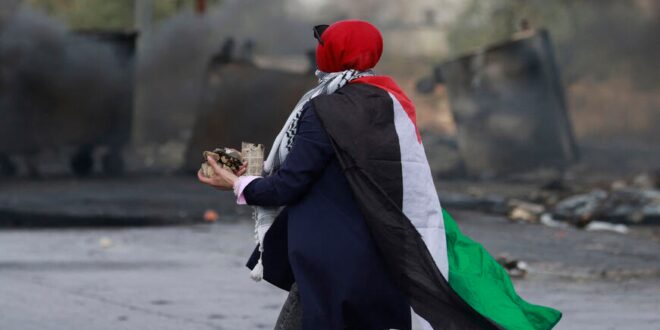The West Bank was tense even before the Hamas-Israel war amid the emergence of armed groups and almost daily Israeli raids in Palestinian cities and towns.
As the Hamas-Israel war rages in Gaza, Israel is intensifying raids and arrests in the West Bank in an attempt to prevent an eruption on another front.
The Palestinian health ministry in Ramallah reported that at least 81 Palestinians have been killed by Israeli troops or settlers in the West Bank since the Gaza conflict erupted on October 7.
Palestinians in the West Bank are enraged by the bombardment of Gaza along with the silence of the Arab states and the international community, which they view as complicit in Israel’s actions. Their anger is also directed at the Palestinian Authority (PA) and its stance, which they believe does not meet the moment of what Israel is doing to Gaza.
On Tuesday evening, hundreds flooded the streets of major West Bank cities and towns after a deadly airstrike, initially blamed on Israel, hit al-Ahli Arab Hospital in Gaza City, killing hundreds of Palestinians.
Clashes between protesters and Palestinian security forces erupted in several areas, as the demonstrators against the PA’s political and security relations with Israel and the United States attempted to approach security and government headquarters. A large number of protesters also headed toward Israeli military checkpoints across the West Bank, clashing with Israeli soldiers for hours.
Similar demonstrations took place on Wednesday, coinciding with a general strike across the West Bank to condemn the hospital attack. In Ramallah on Wednesday, Palestinians held a mass march to protest the planned visit of US President Joe Biden to Israel and the Israeli aerial assault on Gaza.
“Israel is committing a genocide against Gaza, in complicity with Washington. The PA is required to boycott the US and to halt its security coordination and sever relations with Israel,” Bilal Bisharat, one of the demonstrators, told Al-Monitor. “The Arab regimes no longer feel any shame. In the past, [Arab countries] would close Israeli embassies and expel the ambassadors [to condemn Israeli actions], but today they did not bother to take any position in support of Palestinians.”
Raids and arrests
Since Oct. 7, residents of the cities and refugee camps of the territory have been subjected to daily arrests and raids by Israel, often leading to deadly clashes. The Israeli army set up additional checkpoints across the West Bank, further sealing off Palestinian areas from each other. Meanwhile, settlers have been attacking Palestinians with firearms on an almost daily basis.
Fearing that the situation might get out of hand, US officials, including Secretary of State Antony Blinken, have encouraged Palestinian Authority President Mahmoud Abbas to maintain calm and stability.
Thursday began with a series of raids by Israeli forces. In the Noor al-Shams refugee camp, near Tulkarem, violent confrontations, including Israeli drone strikes, broke out and would last for more than 27 hours. By nightfall, 13 Palestinians from the camp had been killed, including five children, according to the Palestinian Health Ministry.
But on Thursday alone, the Israeli army arrested 150 Palestinians, half of them from the city of Hebron and mostly Hamas leaders and former prisoners, including Hassan Yousef and Nayef Rajoub, both prominent in the group and were arrested several times.
Emergence of armed groups
The situation in the West Bank had been tense long before the war erupted in Gaza. In the past two years, several armed groups emerged across the territory and conducted a series of attacks against Israeli forces and settlers. Israel had been arresting Palestinian fighters daily, while the PA sought to tamp down the situation by also making arrests.
West Bank Palestinians picked up the pace of their military actions after the Gaza escalation, shooting at military sites and employing explosive devices to counter Israeli raids.
According to the Palestine Information Center (Mo3ta), which documents armed activity in the Palestinian territories, 1,089 incidents since the start of the war on Gaza until midday Wednesday. The actions included 312 shootings and 739 direct clashes, leaving one Israeli dead and 23 others injured. There were also 167 marches and demonstrations, according to the center.
The West Bank armed groups declared a state of high alert among their fighters in response to events in Gaza and claim to have carried out dozens of shootings against military checkpoints.
Suleiman Bisharat, director of the Yabous Center for Consulting and Strategic Studies, told Al-Monitor, “The current situation is a general struggle that is not limited to the Gaza Strip. The West Bank has been at the center of events and confrontations with Israel since 2022.”
Bisharat believes that the continued Israeli assault on Gaza and other actions against the Palestinians will lead to an implosion in the West Bank.
“If no humanitarian or political breakthrough is achieved in the coming days, we will witness a greater resistance action,” he said. “In the past two years, the West Bank has witnessed growing armed action amid the growing capabilities of armed groups, at the expense of popular movement. But since the war, it seems popular action has somewhat recovered.”
 Eurasia Press & News
Eurasia Press & News




